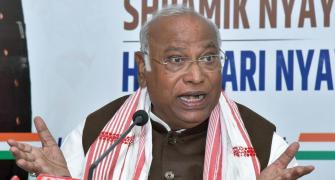Bond dealers are back on the trading floor, sensing a drop in interest rates. The yield on the 10-year benchmark government paper, which rose to 8.42 per cent in July, closed at 7.68 per cent on Thursday after having dropped to 7.61 per cent on Wednesday.
Despite the rise of yields on Thursday on Reserve Bank of India Governor YV Reddy's concerns over inflationary pressures, bond dealers feel they will drop further. The 10-year yield is a barometer for market-driven interest rates.
A tell-tale sign of a benign interest rate outlook is the compression of spread between the yields on long and short-term gilts. At the height of the bull run in October 2003, when the 10-year yield dropped to its life-time low of 4.94 per cent, the spread between 10-year and 1-year yields dropped to 44 basis points (one basis point is one hundredth of a percentage point).
In July, it rose to 137 basis points, with the 10-year gilt yield ruling at 8.42 per cent and the yield on the 364-day treasury bill at 7.05 per cent.
This has dropped to about 80 basis points now. "This is a sure sign of an impending bull run," said a bond dealer with a primary dealing house.
Bhaskar Sen, general manager, treasury, Union Bank of India, said banks had started taking positions in the bond market after staying away for about two years.
The US Federal Reserve's decision to hold interest rates against the backdrop of a slowdown has changed market sentiment dramatically. Finance Minister P Chidambaram's statement that the inflation rate would be contained and economic growth sustained also added to the sentiment.
In an interview to a wire agency in Seoul, Chidamabarm on Thursday hinted the Reserve Bank of India (RBI) might not need to raise interest rates further, even as RBI Governor YV Reddy in Delhi said there was no direct co-relation between US and Indian rates.
"We do not expect any rate cut now but it could happen next year if the US slowdown intensifies," said a senior banker.
Apart from a benign interest rate outlook, the other factor driving gilt prices (yield and bond prices move in opposite directions) is banks' rising appetite for statutory liquidity ratio (SLR) securities.
Against a requirement of 25 per cent SLR, banks were holding 41.5 per cent in 2004-05. Over the last two years, they sold the excess SLR and now the average level has come down to 27 per cent.
According to industry sources, Union Bank, Corporation Bank, Canara Bank, Bank of India and a few others have been holding just about 25 per cent SLR, while State Bank of India, Punjab National Bank and Bank of Baroda's SLR holdings are marginally higher.
The northward movement of bond prices is the main reason for the rise in bank stock prices this month. Over the last six quarters, banks were required to make provisions to mark to market gilts in their portfolios (as prices feel below the acquisition cost) but now with rising bond prices, they will not need any provision. They will, in fact, book trading profits.
In an interview to a wire agency in Seoul, Chidambaram on Thursday hinted the RBI might not need to raise interest rates further, even as Reddy in Delhi said there was no direct co-relation between US and Indian rates.
Apart from a benign interest rate outlook, the other factor driving gilt prices (yield and bond prices move in opposite directions) is banks' rising appetite for statutory liquidity ratio (SLR) securities.
Against a requirement of 25 per cent SLR, banks were holding 41.5 per cent in 2004-05. Over the last two years, they sold the excess SLR and now the average level has come down to 27 per cent.
According to industry sources, Union Bank, Corporation Bank, Canara Bank, Bank of India and a few others have been holding just about 25 per cent SLR, while State Bank of India, Punjab National Bank and Bank of Baroda's SLR holdings are marginally higher.








